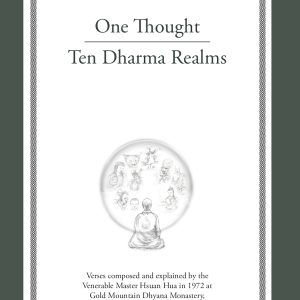
One Thought Ten Dharma Realms, verses by Ven. Master Hsuan Hua
Buddhist Text Translation Society releases One Thought Ten Dharma Realms, a collection of verses and commentary by the Venerable Master Hsuan Hua.
Published by BuddhistTexts.org. Available on Amazon (US) and BTTS (international).
Ten Dharma Realms in a single thought,
We find them only here and now;
Awaken to this very thought:
Just then we reach the other shore.
This concise and engaging book opens our minds to the various possible realms of existence in the Buddha’s teachings, describes their psychological landscapes, and serves as a travel guide for those on their spiritual journey to awakening.
The talks begin with the sagely realms of the Buddhas, Bodhisattvas, Solitary Sages, and Voice Hearers, and then goes into detail for the six realms of rebirth with Devas, Asuras, Humans, Animals, Ghosts, and the Hells.
With the discussion of each Dharma Realm comes the instructions as to how we can ascend into higher realms, or descend, based on our everyday thoughts, actions, and deeds.
“Don’t look lightly on these verses: The Ten Dharma Realms are Not Beyond a Single Thought. One thousand years from now, many people may wake up simply by reading them.”
—Venerable Master Hsuan Hua
EDITORIAL EXCERPT:
Spoken in San Francisco in 1972 to a group consisting of mostly young adventurous Westerners, Master Hua delivers these talks with a great deal of energy and humor. The audience would often be laughing at a play on words or a back-and-forth dialogue Master Hua would have with himself—playing both the inquisitive disciple and the learned teacher. He often spoke in “matching couplets”—a poetic Chinese form in which two sentences balance each other to form a complete whole:
A person can become a Buddha.
A Buddha is an awakened person.
The presentation is not just stylistic, but presents the Dharma in a way that gives a balanced view of a principle. These teachings become seeds for awakening that are planted in our minds, and if we nurture these seeds by putting the Dharma into practice, these seeds sprout, mature, and bear fruit.
Master Hua also directly engaged the audience by asking rhetorical questions that model a process of self-inquiry. Often the questions he asks are just as important as the answers he gives. These questions serve as pointers for our investigation of the Dharma. The ultimate aim is to see the Dharma for ourselves. At this point, we embody the teachings effortlessly; our daily actions of body, mouth, and mind are naturally in harmony with the way things are.
Therefore, studying the Dharma is ultimately a realization of our highest potential. How much we can absorb and receive relies on how open our hearts and minds can be. There is no rush—read one Dharma Realm at a time and then reflect on it. Each passage in the commentary is filled with principles to contemplate. “How can I apply this to my life?” is a good question to ask. True wisdom is being able to take one principle and apply it in all of our activities through-out the day.
This translation tries to bring Master Hua’s teachings to life by capturing as much of the energy of the original talk as possible without being distracting. In these talks, he is quite playful and relaxed. There seems to be a gentle smile behind his words.
Cont.
—Bhikshu Jin Chuan
EXCERPT: Verse on the Dharma Realm of Humans
Humanity’s path is harmony,
Our merits and offenses mixed up together;
On good deeds we rise, evil make us fall,
There is no one else to blame at all.
The human realm is a mixture of good and bad.
Humanity’s path is harmony,
Humans have a harmonious disposition and are capable of getting along with others.
Our merits and offenses mixed up together;
Those who become human beings are neither completely good nor completely bad. Those who are completely good are reborn in the heavens, while those who are thoroughly bad become animals, hungry ghosts, or fall into the hells.
We all have both merits and offenses. Either we have a great deal of merit and few offenses, or we have little merit and many offenses.
When we have a great deal of merit and few offenses
then we will be born into a rich and prominent family.
When we have little merit and many offenses,
then we will be born into a poor and lowly family.
Between these two extremes are many different gradations.
Therefore, the verse says: “Our merits and offenses mixed up together.”
We have a bit of merit, and we have a few offenses.
Another way of describing merit and offenses is yin and yang, so we are not totally yin or totally yang.
Pure yin: we would be reborn as ghosts and not as human beings.
Pure yang: we would be reborn as devas and also not as human beings.
So, we as humans can ascend to the heavens or fall into the hells.
On good deeds we rise, evil makes us fall,
If we do good and create merit, we rise.
If we do evil and commit offenses, then we fall.
There is no one else to blame at all.
Other people cannot force you to fall into the hells, make you a hungry ghost, or cause you to become an animal. It is entirely up to what you do. You reap what you sow. You yourself must endure the consequences of your own actions.